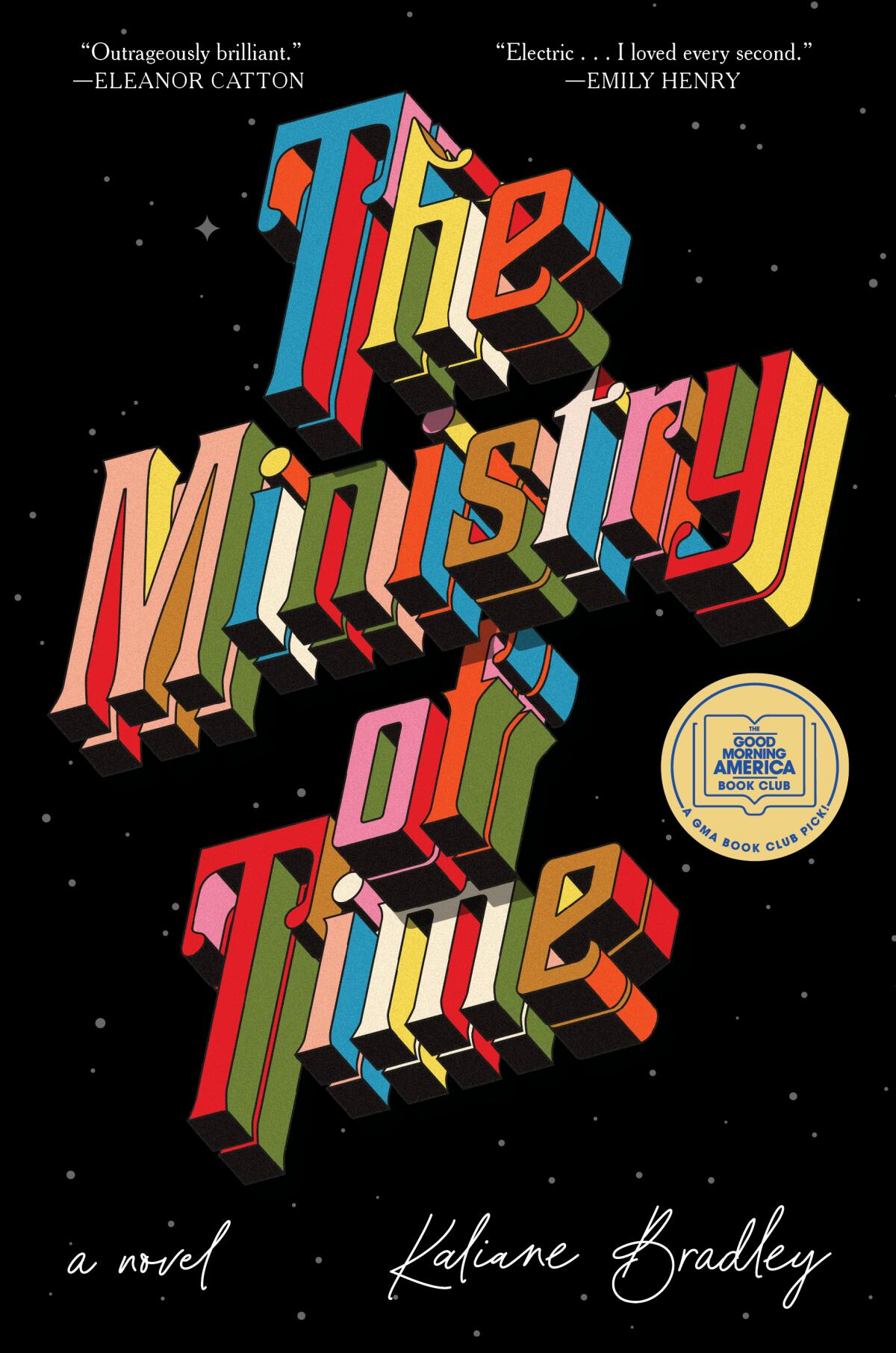Time travel and surveillance state paranoia collide in a witty, thought-provoking romance novel

- Share via
Book Review
The Ministry of Time
By Kaliane Bradley
Avid Reader Press: 352 pages, $28.99
If you buy books linked on our site, The Times may earn a commission from Bookshop.org, whose fees support independent bookstores.
“People aren’t history,” scoffs Adela, vice secretary of the Ministry, whose work is shrouded in secrecy and subterfuge. This retort comes late in Kaliane Bradley’s debut novel, “The Ministry of Time,” but it’s a telling line. Its dismissal of individual lives reveals the novel’s stakes. If people aren’t history, what is? This is a disturbing statement to come out of the mouth of a high-ranking British bureaucrat. For a book that could also be easily described as witty, sexy escapist fiction, “The Ministry of Time” packs a substantial punch.
Of late, many critically acclaimed books embrace mystery and absurdity in a way that both suspends and expands conventionally held notions of time. Hilary Leichter’s “Terrace Story,” National Book Critics Circle award winner Lorrie Moore’s “I Am Not Homeless If This Is Not My Home,” Ali Smith’s “Companion Piece,” National Book Award winner Justin Torres’ “Blackouts,” and Marie-Helene Bertino’s “Beautyland,” among others, forge poignant, bracing emotional connections. Their playfulness reveals possibilities and perspectives that might be lost in a novel bound by fact-checked 21st century reality. After all, in a world where nothing feels normal, fiction that embraces a disregard for physics and convention mirrors our new upside-down quotidian life.

To this end, Kaliane Bradley proves that it’s possible to address imperialism, the scourge of bureaucracy, cross-cultural conflict and the paranoia inherent in a surveillance state through her utterly entertaining novel. “The Ministry of Time” begins with a sixth-round job interview for an undisclosed position. The unnamed narrator is caught off guard when “the interviewer said my name, which made my thoughts clip. I don’t say my name, not even in my head. She’d said it correctly, which people generally don’t.” For the narrator, who “plateaued” as a “translator-consultant” in the Languages department of the Ministry of Defense, this top-secret job that pays three times her current salary is worth the mystery.
Soon the work is disclosed. The narrator, whose mother immigrated to the United Kingdom from Cambodia, will be working closely with people who might bristle at the term “refugees.” She’s now part of the Ministry of Expatriation working with one of five “expats” scavenged from the past. Confident in her storytelling, Bradley sweeps away the details of how and why time travel exists in the novel.
Rachel Khong’s irresistible puzzle of a second novel suggests it is a mistake to think we can force complex, nature-nurture identities in a chosen direction.
“All you need to know is that in your near future, the British government developed the means to travel through time but had not yet experimented with doing it.” With that, from the jump, readers and characters alike are asked to take a leap of faith as the narrator assumes the role of a “bridge” between an “expat” and modern life. The larger purpose of her work is elusive to her as well, but, in short, the narrator is tasked to be the roommate of an explorer named Commander Graham Gore who died on a doomed Royal Navy Arctic exhibition in 1847. He’s mannered, understandably jumpy, but also rather sexy for someone who died close to 200 years ago. Will this be an odd sort of meet-cute, or is something more chaotic afoot?
Buckle up, the ride has just begun. Juggling notions of “hereness” (the present) and “thereness” (the past), the novel’s five expats come to grips — or not — with the fact that they have been snatched from the past. The ministry selected individuals who were on the point of death so that their departures from the past would in no way rupture their historic timelines. But how would they affect the present? The bridges take notes, and medical examinations are de rigueur, but these collected data are merely passed along without much in the way of analysis.
The expats and bridges adjust to life together in a largely amusing fashion, sharing lovely homes provided by the ministry, visiting pubs, learning about the very existence of cinema. Music streaming services are a hit, but, generally speaking, the expats find it hard to accept the scale of modern life. Whether this is due to some physical mutation created by the process of time travel or if it’s merely the challenge of cultural displacement for people “loose as dust in narrative time,” true fissures begin to surface.
How many lives can one author live? In new short stories, Amor Towles invites us along for the ride
For fans who worry that a volume comprising six stories and a novella won’t serve up the deeper delights of his novels, prepare for what may be Towles’ best book yet.
In a manner that feels wholly unsurprising to the reader, suspicions arise as to the nature of the project. Why exactly is there a need for secrecy and what are the particulars about this ability to time travel that we’re asked to tacitly accept? Tensions also flare between the narrator and another bridge, Simellia, who are the two people of color in this tightly knit circle. The specter of imperialism looms and informs a certain tension between the narrator and Gore. Yet, as a green bureaucrat, happy to rise in the ranks, she confronts Simellia, saying, “You signed up for this job… [knowing], as much as I did, that what we were doing was world-changing. That’s what you wanted, remember? Do you think the world changes by being asked politely? Or do you think there has to be risk?”
But this brash confidence begins to waver. The narrator recognizes, “Every time I gave Graham a book, I was trying to shunt him along a story I’d been telling myself all my life.” Then she notes that the ministry “fed us all poison from a bottle marked ‘prestige’ and we developed a high tolerance for bitterness.” While the book does assume some obvious postures of university level post-colonial theory and language, it moves past these more cliched moments by focusing its attention on the characters. A tight narrative rich with witty banter, cutting observations and interspersed passages from Gore’s doomed expedition also keep the novel taut.
“Maybe I was tired of stories, telling them and hearing them,” muses the narrator. Curiously, while she made languages her profession (hence her tendency to consider that “the great project of Empire was to categorize: owned and owner, coloniser and colonised, evolué and barbarian, mine and yours.”), her antagonistic younger sister became a writer. Finding herself falling in love with Gore, the narrator becomes the story, upending history.
As the story’s momentum builds into that of a spy thriller, Bradley pulls off a rare feat. “The Ministry of Time” is a novel that doesn’t stoop to easy answers and doesn’t devolve into polemic. It’s a smart, gripping work that’s also a feast for the senses. An assassination, moles, questions of identity and violence wreak havoc on our happy lovers and the bubble they create in London. Yet our affection for them is as fresh and thrilling as theirs is for one another, two explorers of a kind, caught in a brilliant discovery. Bradley’s written an edgy, playful and provocative book that’s likely to be the most thought-provoking romance novel of the summer. Check your history: That’s no small feat.
Lauren LeBlanc is a board member of the National Book Critics Circle.
More to Read
A cure for the common opinion
Get thought-provoking perspectives with our weekly newsletter.
You may occasionally receive promotional content from the Los Angeles Times.











